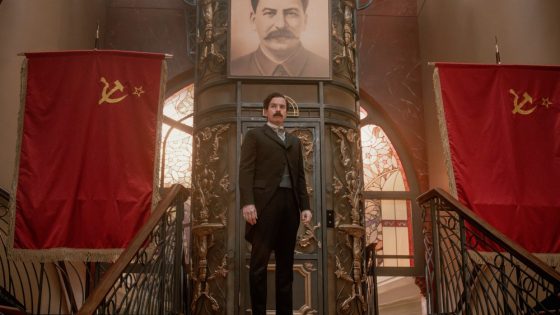The titular gentleman of “A Gentleman in Moscow” is Count Alexander Rostov, a Russian aristocrat played with sprightly joie de vivre by an enthusiastic Ewan McGregor. An aesthete with impassioned opinions about wine pairings, Rostov was born to live the life of leisure handed down to him by his landowning ancestors. (When asked about his job, he replies huffily: “It’s not the position of a gentleman to have occupations.”) The problem is that Rostov is a man unfit for his time. Before he can assume management of his family’s country estate, the Russian Revolution rudely intervenes. A populist poem from his student days spares Rostov the firing squad, relegating him instead to a lifetime of house arrest in Moscow’s fictional Metropol hotel.
Based on the bestselling novel of the same name by Amor Towles, “A Gentleman in Moscow” follows Rostov through the doors of the Metropol and stays there through decades of Russian history, from the formation of the Soviet Union to Stalinist repression to World War II and beyond. Creator and writer Joe Murtagh (“Gangs of London,” “The Woman in the Wall”) renders Rostov’s journey in eight hourlong episodes, a length at once condensed from Towles’s 500-page tome and distended from where the story feels most comfortable onscreen. “A Gentleman in Moscow” may present Rostov and his kind as an endangered species, but the series is part of an all-too-common trend: a limited series built around a star performance that’s engaging, but not enough to stretch a movie-sized idea into a TV-sized narrative.
Rostov’s confinement is far from solitary. Long acquainted with the staff of the Metropol as a favored guest, he soon joins their ranks as a waiter, gamely assisting a crew of maids, cooks and barkeeps in preserving a sense of old-world hospitality. The erstwhile Count — honorifics are banned under Bolshevik rule — strikes up a clandestine romance with actress Anna Urbanova (Mary Elizabeth Winstead, who’s married to McGregor in real life) and a doting, avuncular friendship with Nina (Alexa Gooddall), a young girl and fellow captive who masters the Metropol like a mix of Anastasia and Eloise. Rostov’s main points of contact with his jailers are his handler Osip (Johnny Harris), who solicits private lessons in culture to better grasp his bourgeois adversaries, and Bishop (John Heffernan), a Metropol employee who senses opportunities for advancement amid social upheaval.
But none of these characters ever compete with Rostov for the center of the series’ attention. They are, at best, accessories to his maturation from unserious dilettante to an impassioned protector of his adopted family, or an audience to his anecdotes about a bygone era. McGregor gamely sports a mustache and animates Rostov with a boyish naiveté. (After “Fargo,” “Halston” and “Obi-Wan Kenobi,” the actor seems to have taken to TV as a showcase for his talents.) His Rostov is compelling, yet also familiar — Towles’ novel was published in 2016, just a couple years after Ralph Fiennes portrayed a similar figure in Wes Anderson’s “The Grand Budapest Hotel,” which brought its namesake property to life with much more stylistic brio than directors Sam Miller and Sarah O’Gorman bring to the Metropol. There’s a ceiling to how much McGregor can do with a protagonist who clings to such established contours of vintage propriety caught up in the tides of history.
There’s also the matter of context. “The Grand Budapest Hotel” took place in a fictional country, but it referenced the rising tide of European fascism in the 1930s, a theme with obvious resonance for contemporary viewers. “A Gentleman in Moscow” deals with Communist repression, which is both a throwback to Cold War anxieties and an inherently political subject for a stubbornly apolitical show. Rostov’s college friend Mishka (Fehinti Balogun) hails from a more proletarian background and ends up on the opposite side of the revolution, but their differences stem more from personal strife than ideology. In their school days, Rostov thwarted Mishka’s romance with his sister, an intervention with tragic results.
“A Gentleman in Moscow” otherwise avoids having Rostov question whether his former lifestyle ever came at others’ expense or cultivating his views on current events beyond melancholy regret. This absence might be less conspicuous were the show more overtly abstract and allegorical á la “The Regime,” another series set largely within the walls of a requisitioned hotel. But the Metropol, while clearly constructed on a soundstage, is realistic enough to invite questions about the outside world. Towles could relay those developments in writing; on TV, we can’t see how Russia is changing because we’re trapped inside with Rostov, a deliberate choice that nonetheless leads to visual monotony and cuts off a potential source of plot.
Without external stimuli, we’re stuck with a simplistic fable of a charming fogey embracing the redemptive power of love. In a different industry, “A Gentleman in Moscow” would be a two-hour feature a book club could take in as a Saturday matinée. In this one, it’s a show that pads itself out rather than cultivating its ensemble or engaging with deeper, more substantive issues than Rostov’s personal plight. You won’t mind spending time with the Count, but he won’t follow you through the Metropol’s revolving door.
The first episode of “A Gentleman in Moscow” is now available to stream on Paramount+ and will air on Showtime on March 31 at 9 p.m. ET, with remaining episodes streaming weekly on Fridays and airing on Sundays.
Source Agencies


